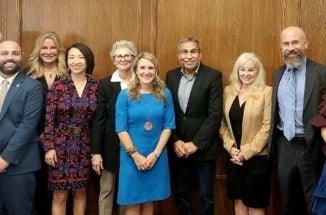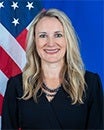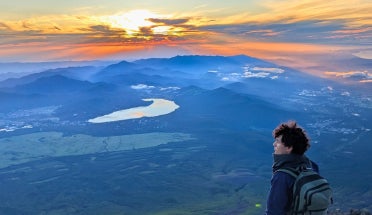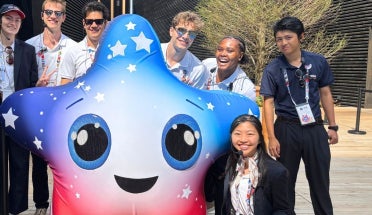
Deputy Assistant Secretary Camille Purvis Dawson Returns to UT Austin for YSEALI Reception
- Dec 20, 2022
- Global Alumni Relations
- by Alex Briseño
Before building a 22-year career in international affairs with the U.S. Department of State, Texas Ex Camille Purvis Dawson expressed an initial interest in domestic politics during her time as a student at The University of Texas at Austin.

As a Plan II major with a concentration in government, Dawson envisioned herself running for elected office. That changed during her junior year when she took a United States foreign policy course taught by Jim Roach, a longtime UT Austin government professor who passed in 2010.
“That course took me down the path of realizing that I actually wanted to pursue something in international affairs rather than domestic U.S. policy,” said Dawson.
Dawson became a career member of the Foreign Service, where she has spent more than two decades designing and implementing diplomatic and public engagement and communication strategies for the State Department.
Before assuming her current role as the deputy assistant secretary in the Bureau of East Asian and Pacific Affairs (EAP) in 2021, Dawson served as the director of the Office of Public Diplomacy for EAP (2019-2021). Earlier in her time with the State Department, Dawson also served as counselor for public affairs at the U.S. Embassy Singapore (2016-2019), Africa regional media hub director in Johannesburg, South Africa (2013-2016), and deputy spokesperson in Beijing (2003-2005), just to name a few.
In November, Dawson returned to the Forty Acres for the first time in 10 years, to speak at the Young Southeast Asian Leaders Initiative (YSEALI) Professional Fellows Program Host Reception. As a signature program of the State Department, YSEALI strengthens leadership development and networking across Southeast Asia through a variety of programs, including U.S. educational and cultural exchanges.
During her return visit to campus, Dawson sat down for an interview with Texas Global to discuss her career path, some of the issues she works on with the State Department, and advice for students contemplating a career in international affairs.
What is one of the biggest challenges you’ve faced in your career, and what did you learn from it?
When I graduated, I moved to Japan and taught English for two years through a program called the Japan Exchange and Teaching program, or JET. Japan was not a country that I had any prior experience with—I didn’t speak Japanese before I went, so I showed up there and learned as I went. I was living in an area of the country that was not very internationalized; there were very few people who spoke English.
As a 22-year-old, that was my first time to be far away from home—and certainly my first time to realize that I was going to be thrust into situations where I could not use my words to communicate what I needed to get across. It was a challenge that I was able to overcome by studying the language. I also realized that, in general and on a global scale, people are nice and kind.
Eventually, I learned enough Japanese to get around. It was important for me to recognize as a young person that I could do things on my own without the support of my parents or my friend group.
How does it feel to return to campus for the YSEALI Professional Fellows Program Host Reception?
YSEALI is one of many exchange programs that are funded by the U.S. Department of State. What it is focused on doing is bringing together young people from the Southeast Asia region, ages 18-35, and connecting them with participants from other Southeast Asian countries, as well as with Americans.
Part of what brings me here on this trip is getting to engage with the Americans who have been participants in the YSEALI program by hosting our YSEALI fellows—either as home hosts, where they invite them over for dinner and offer an American experience, or in some cases, as organizational hosts. When our YSEALI fellows are looking to understand the way that an American organization in their professional field operates, this professional host provides an opportunity for shadowing and sharing best practices.
The great thing about YSEALI and many of our exchange programs is that the fellows then take that knowledge back to their home countries and share it with a broader community, so it has this type of multiplier effect. It's just awesome to see a program like this operating on the UT Austin campus.
How did your experience at UT Austin shape your career and help you get to where you are now?
What I think was most important for me is that the education I received here, which was very much focused on this broad liberal arts curriculum through the Plan II program, gave me not one specific path of information. It wasn’t limited to one particular topic area, but really more about understanding the broad framework and how you can collect the information you need at the time you need it.
That is what is most relevant in the work that I do in the State Department, because it has changed every two or three years as I move around to different countries and work on different issues. It doesn't work to be just an expert in one specific issue. You have to be someone who can quickly obtain knowledge and information.
Having that experience at UT, which was about working on a little bit of everything and then figuring out how to draw upon what you need at the right moment, has been really valuable to me. Don't let anyone tell you that you have to specialize in only one thing.
At what point did you start to see a long-term career path with the State Department?
I joined the State Department when I was relatively young, about 26. After graduating from UT Austin, I spent two years in Japan and then went to graduate school at Columbia University for a degree in international affairs, and joined the State Department very soon after that.
When I joined the State Department, I wasn't entirely sure what to expect. I didn't know if it would be something that I would do for a few years or for an entire career. At that time when I entered the State Department, which was in January 2000, it was very much the norm that Foreign Service was a long-term career. People generally came in and stayed for 20 or 30-plus years. I wasn’t sure if that was going to be the case for me. But within a few years, it became clear to me that I could envision a long-term career with the State Department.
I think that in my case, a big reason for that is that the job never gets boring. You are changing locations, or you're changing the issues that you work on every few years. Just when you kind of get into a lull, then there's something new. I like that constant intellectual stimulation of learning new issues, a new culture or a new language.
What is the Indo-Pacific region’s importance to Texas?
The Indo-Pacific region is basically the area that stretches from the Indian Ocean, or the west coast of India, to the West Coast of the United States—that area of the world is critically important. That region encompasses half the world's population, and it's about two-thirds of the global economy.
When we look at projected economic growth in decades to come, we anticipate about two-thirds of global growth will come from that region. Investment from the region into the United States creates American jobs, brings all kinds of opportunities to Americans, and then we boil that down to the state level: What is it bringing to Texas?
We know that almost a quarter of exports from Texas go to the Indo-Pacific region. There is a huge amount of investment from the region into Texas, and that two-way trade between Texas and the Indo-Pacific region creates around 400,00 jobs for people in Texas.
We also look at the impact of educational exchange: There are over 50,000 students from the Indo-Pacific Region studying at Texas universities. That brings something like $1.4 billion annually to the Texas economy. These figures are really quite tremendous and demonstrate why the average person living in Texas should care.
UT Austin students interested in pursuing careers in or related to East or Southeast Asia can learn more and register to attend the 2023 Symposium via the Global Professional Training: East and Southeast Asia page at Texas Global.



